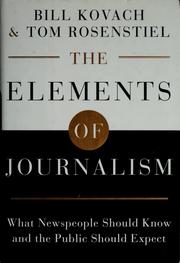Check nearby libraries
Buy this book

In July 1997, twenty-five of America's most influential journalists sat down to try and discover what had happened to their profession in the years between Watergate and Whitewater. What they knew was that the public no longer trusted the press as it once had. They were keenly aware of the pressures that advertisers and new technologies were putting on newsrooms around the country. But, more than anything, they were aware that readers, listeners, and viewers, the people who use the news, were turning away from it in droves. There were many reasons for the public's growing lack of trust. On television, there were the ads that looked like news shows and programs that presented gossip and press releases as if they were news. There were the "docudramas," television movies that were an uneasy blend of fact and fiction and which purported to show viewers how events had "really" happened. At newspapers and magazines, celebrity was replacing news, newsroom budgets were being slashed, and editors were pushing journalists for more "edge" and "attitude" in place of reporting. And, on the radio, powerful talk personalities led their listeners from sensation to sensation, from fact to fantasy, while deriding traditional journalism. Fact was blending with fiction, news with entertainment, journalism with rumor. Calling themselves the Committee of Concerned Journalists, the twenty-five determined to find how the news had found itself in this state. Drawn from the committee's years of intensive research, dozens of surveys of readers, listeners, viewers, editors, and journalists, and more than one hundred intensive interviews with journalists and editors, this work is the first book ever to spell out, both for those who create and those who consume the news, the principles and responsibilities of journalism. Written by two of the nation's preeminent press critics, this is one of the most provocative books about the role of information in society in more than a generation and one of the most important ever written about news. By offering in turn each of the principles that should govern reporting, the authors show how some of the most common conceptions about the press, such as neutrality, fairness, and balance, are actually modern misconceptions. They also spell out how the news should be gathered, written, and reported even as they demonstrate why the First Amendment is on the brink of becoming a commercial right rather than something any American citizen can enjoy. This book ignites a national dialogue on issues vital to us all and it is the starting point for discussions by journalists and members of the public about the nature of journalism and the access to information.
Check nearby libraries
Buy this book

Previews available in: English
Subjects
Beroepspraktijk, Journalisme, Journalismus, Journalism, Journalistiek, Ethische aspecten, Journalistes, Berufsethik, Déontologie, Journalistic ethics, Research, Writing skills, Style manuals, Social sciences -> mass communication -> journalism, General interests & hobbies -> reference -> reference, English & college success -> english -> compositionPlaces
United States, États-Unis, USA| Edition | Availability |
|---|---|
|
1
Principes du journalisme: Ce que les journalistes doivent savoir, ce que le public doit exiger
2014, Gallimard
paperback
in French
2070462579 9782070462575
|
zzzz
|
|
2
The elements of journalism: what newspeople should know and the public should expect
2013, Crown Publishing Group
in English
- Revised and updated.
0804136793 9780804136792
|
zzzz
|
|
3
The elements of journalism: what newspeople should know and the public should expect
2001, Crown Publishers
in English
- 1st ed.
0609607839 9780609607831
|
aaaa
|
Book Details
Table of Contents
Edition Notes
Includes bibliographical references and index.
Classifications
External Links
The Physical Object
ID Numbers
Community Reviews (0)
Feedback?History
- Created July 9, 2011
- 5 revisions
Wikipedia citation
×CloseCopy and paste this code into your Wikipedia page. Need help?
| November 12, 2023 | Edited by MARC Bot | import existing book |
| July 29, 2020 | Edited by MARC Bot | import existing book |
| July 22, 2019 | Edited by MARC Bot | remove fake subjects |
| August 12, 2011 | Edited by ImportBot | add ia_box_id to scanned books |
| July 9, 2011 | Created by ImportBot | Imported from Internet Archive item record |










